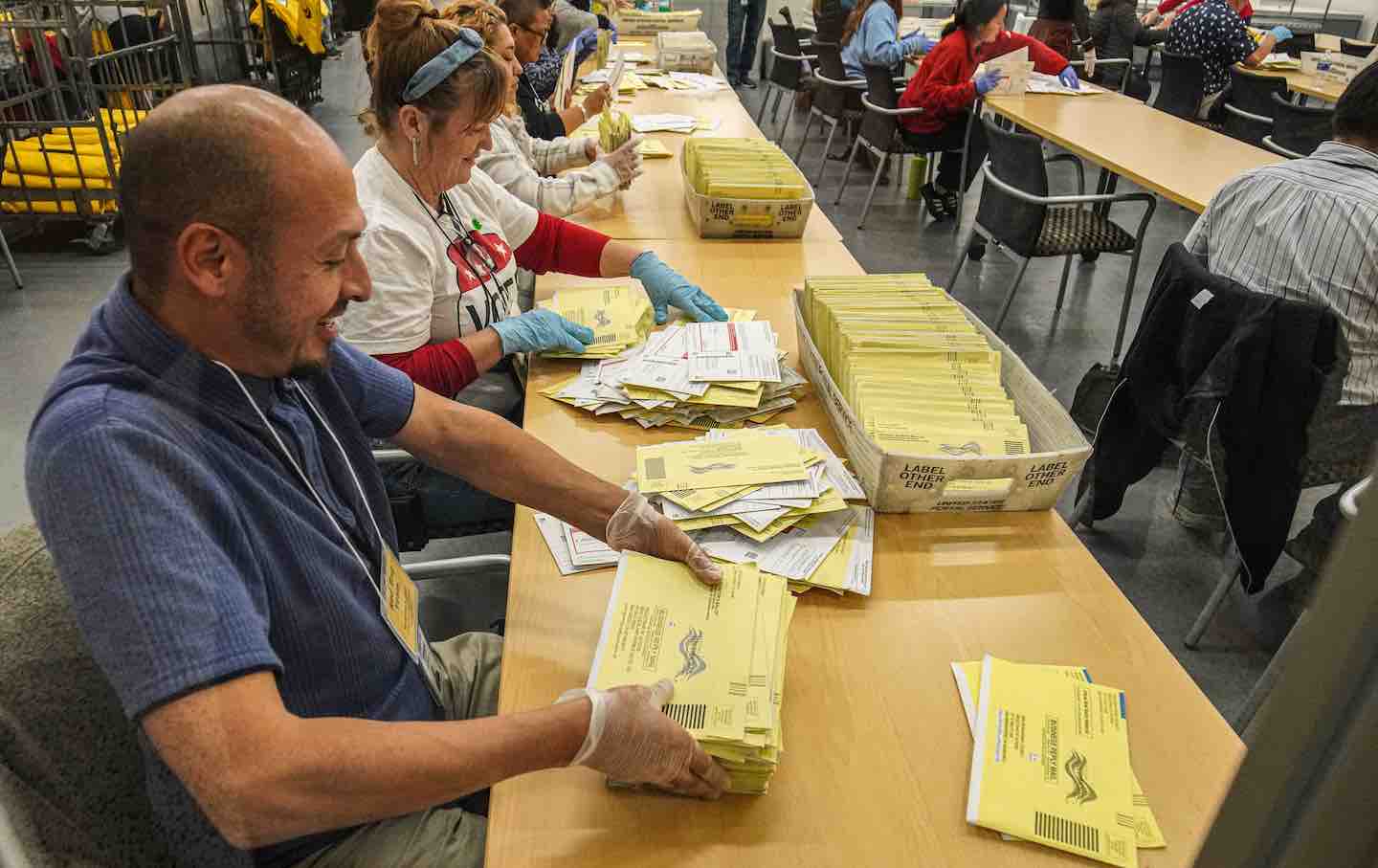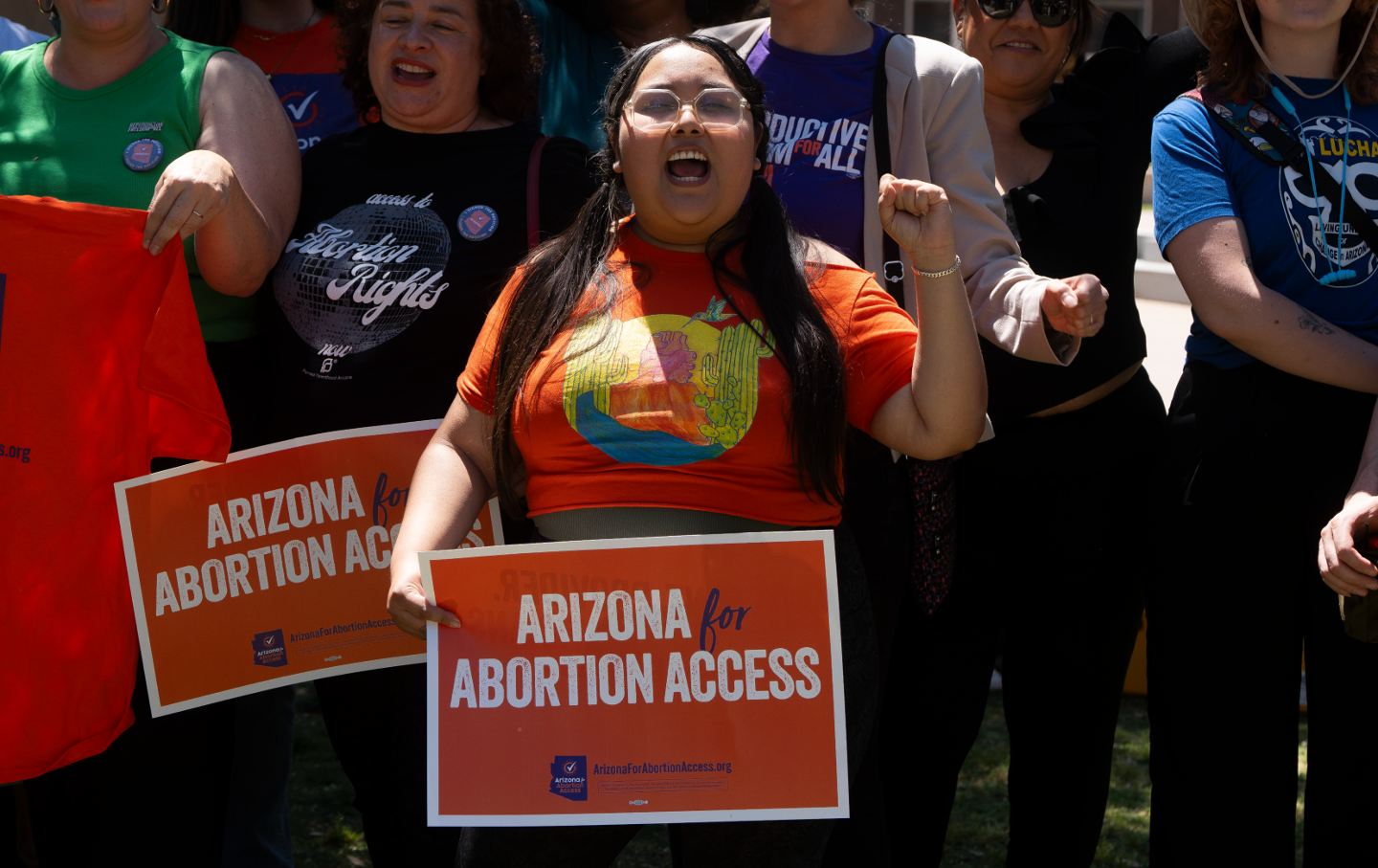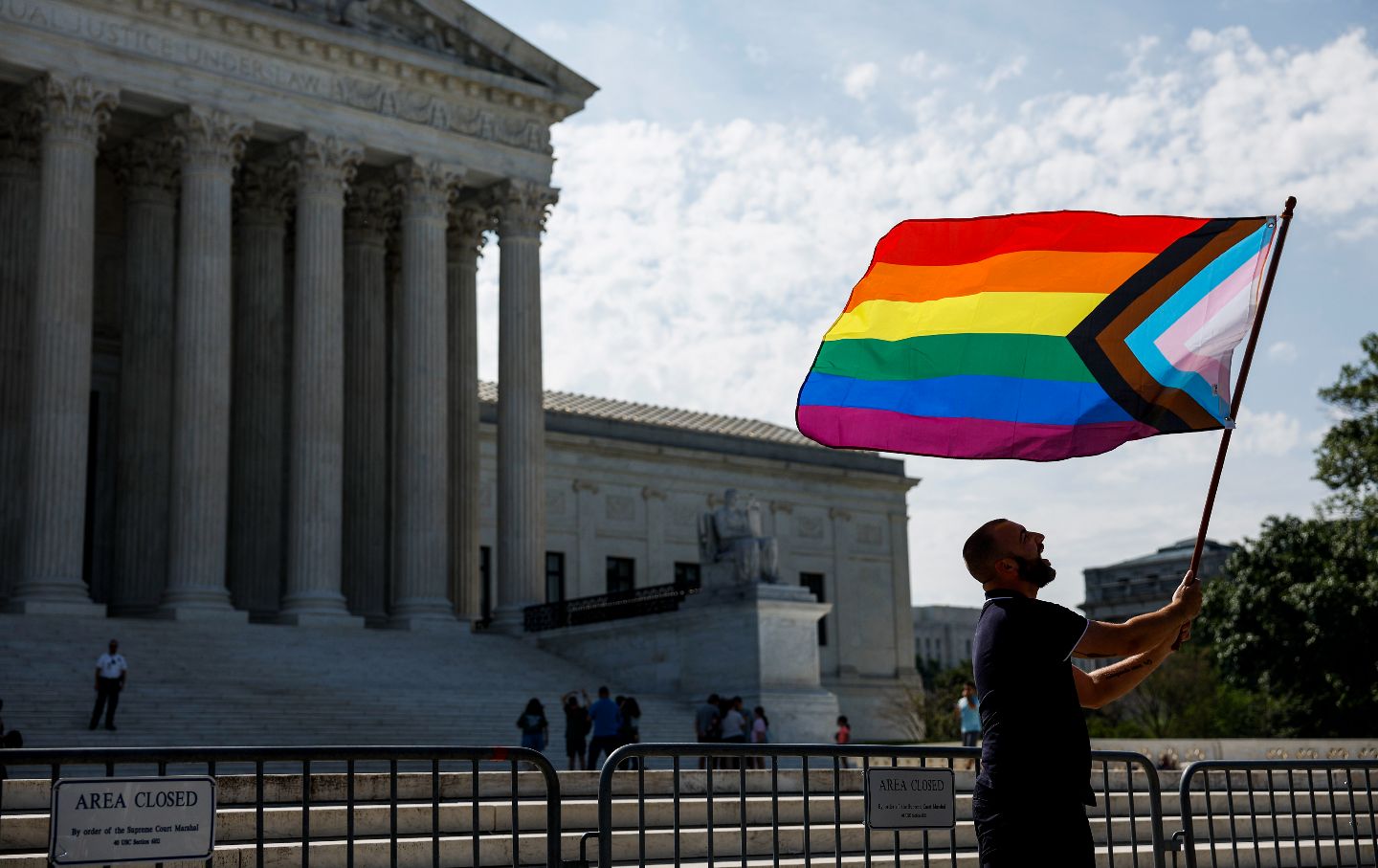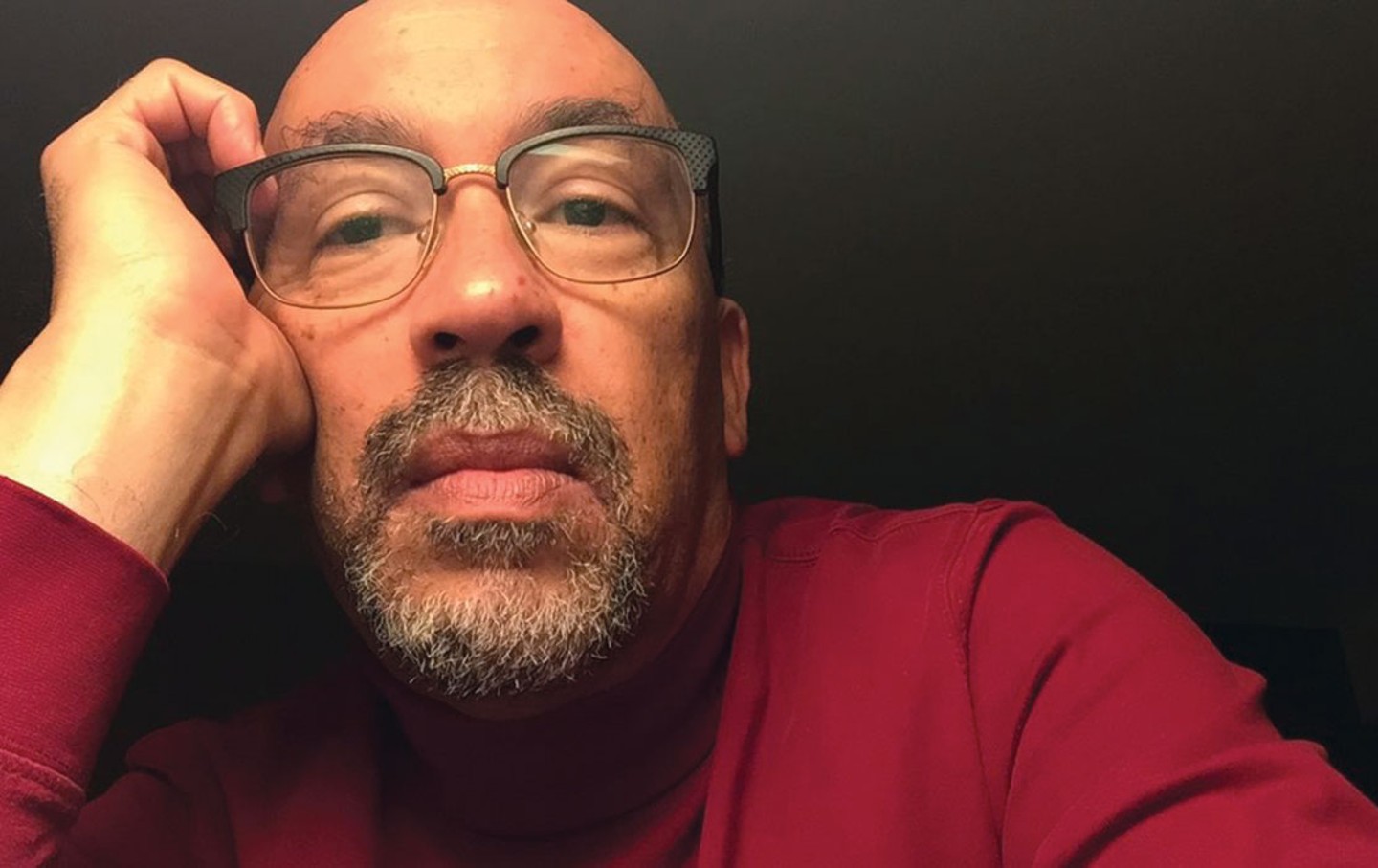Trump world is claiming that the Republican has an overwhelming popular mandate to implement his agenda. Not so fast!

Hundreds of staff members at the San Diego Registrar of Voters Office work overnight to tally the votes.
(Michael Ho Wai Lee / SOPA Images / LightRocket via Getty Images)
Since Tuesday’s shocking election result, Trump and his team have gone out of their way to claim that they have an overwhelming popular mandate to fundamentally reshape American society and governance.
Like so much else that emanates from Trump world, this doesn’t pass the smell test. Yes, Trump has an Electoral College win, but of a smaller magnitude than that of the vast majority of presidents over the past century. The ill-fated Warren Harding, for example, whose corruption at the time seemed unparalleled, but who would probably blush with shame at Trump’s grift-and-grab operation, won 404 Electoral College votes. Herbert Hoover, one of America’s greatest presidential failures, won 444.
More significantly, Trump world is claiming public support for their mandate because he supposedly won the popular vote in a landslide. To be clear, he didn’t. The numbers that the media has been so carelessly broadcasting and printing to back up Trump’s claims are based on an incomplete vote count.
Yes, as of the end of business Tuesday night, Trump had won by about 4.6 million votes and had received over 50 percent support. But because California, Oregon, and Washington have universal mail-in balloting—because they accept any votes either delivered to a drop box before polls close on Election Day or mailed in on Election Day—they have a peculiarly long vote-counting process.
As a result, by midnight on Tuesday, while it was clear that Harris had won all three states, the final vote tally was still unknown.
Even as of Thursday night, more than 40 percent of the vote was still outstanding in California. In Oregon, 20 percent had not yet been tallied. And in Washington, nearly 15 percent remained to be totaled up. Elsewhere in the west, there were large pools of votes still to be added into the mix in Las Vegas and in Phoenix.
Once all those additional votes are added in, Trump’s claim of an overwhelming popular mandate will look a lot less overwhelming. Yes, he will still have more votes than Harris, but not by as much as he is claiming.
By my calculations, Harris’s vote will top out at somewhere between 73 and 74 million, and Trump will likely end up with between 75 and 76 million. So, yes, he will have outpolled Harris, but not by the 4 or 5 percent that he’s touting. He will have beaten her by between 1 and 2 percent—as several national opinion polls accurately predicted would be the case—and his vote total will probably, by the end of the day, fall just below 50 percent.
Similarly, the GOP lock on the House, which the party is broadcasting to all and sundry, may or may not come to pass. But even if it does, when all the votes are tallied in California’s 13th, 27th, 41st and 45th Congressional Districts, it’s likely the Democrats will have picked up enough seats to keep the GOP majority down to a mere handful, quite possibly a smaller majority than the tiny one they currently possess.
None of which is to minimize the scale of this electoral calamity. But it is to raise a couple questions. One of them is the obvious one about the absurdity of an Electoral College system that, time and again, renders the vote totals in the nation’s most populous state entirely irrelevant. Even if Harris’s totals had been large enough out west to give her a popular vote majority, it wouldn’t have mattered in the slightest. She would still have lost the all-important Electoral College, owing to Trump’s laser-focused targeting of key demographics in those states. Had that happened, it would have been the third election of the century to produce a GOP president who didn’t secure a plurality of the vote.
So, if we can’t work out a way to reform the Electoral College, how will we ensure that the popular will and the election outcome match?
The second question is more pragmatic: In the short term, since the Electoral College isn’t going anywhere anytime soon, how can California, and, to a lesser extent Oregon and Washington, speed up their vote count so that their final tallies become a part of the election narrative?
After all, it’s all well and good to make the voting process so inclusive that states accept ballots postmarked by the close of business on Election Day for days, or even weeks after Election Day, but it means that history bypasses them when the media has already shaped the dominant narrative of the election result.
Yes, by the time California, where one in eight Americans lives, finishes counting votes, Trump’s popular support nationally will look rather less impressive than it did on Tuesday night. But, unfortunately, almost no one will be aware of that fact.
When I asked outgoing Representative Katie Porter about this, she argued that, rather than California limiting when ballots can be received by, the rest of the country should adopt the inclusive election policies championed by the three West Coast states.
“Particularly in this moment, where we have seen attacks on the right to vote, I think California, Oregon, and Washington’s model should be the national model,” she said. “In general, it’s not that it’s slow. It’s just that we [California] permit people to vote in every possible secure, legal way up until 8 pm on Election Day. And if you mail it, it takes a while to get there.”
Porter explained that, in her first election, it took nine days for her to be declared the victor. In her second, it took six days.
Popular
“swipe left below to view more authors”Swipe →
Yet she is also acutely aware that much of the media, addicted as it is to the horse race, wants results quickly and has no patience for in-the-weeds explanations about California’s elongated vote-count process. The day after the election, Porter approached several leading television shows to suggest that they interview her about California’s vote totals and discuss how Trump’s numbers weren’t as impressive as his team was putting out. One after another, she says, the shows turned Porter down. “It’s a problem,” she acknowledges. “People like to know quickly, and they cut some corners to do it.”
For my money, this is a huge problem. After all, no one remembers a footnote. The message that Trump’s people have put out is that he has an overwhelming popular mandate to implement all of his ghastly, fanatical proposals. Based on the ongoing vote count in California, this appears to simply not be true. Yet by the time California’s vote is fully tallied, the country will have moved on and most people will no longer be paying attention to the state-by-state minutiae of this election.
Surely, there’s a better way to do this than to have a vote count that takes so long to finish that, by the time it is, it’s no longer viscerally connected, in the public’s mind or the media’s coverage, with the election itself.
We cannot back down
We now confront a second Trump presidency.
There’s not a moment to lose. We must harness our fears, our grief, and yes, our anger, to resist the dangerous policies Donald Trump will unleash on our country. We rededicate ourselves to our role as journalists and writers of principle and conscience.
Today, we also steel ourselves for the fight ahead. It will demand a fearless spirit, an informed mind, wise analysis, and humane resistance. We face the enactment of Project 2025, a far-right supreme court, political authoritarianism, increasing inequality and record homelessness, a looming climate crisis, and conflicts abroad. The Nation will expose and propose, nurture investigative reporting, and stand together as a community to keep hope and possibility alive. The Nation’s work will continue—as it has in good and not-so-good times—to develop alternative ideas and visions, to deepen our mission of truth-telling and deep reporting, and to further solidarity in a nation divided.
Armed with a remarkable 160 years of bold, independent journalism, our mandate today remains the same as when abolitionists first founded The Nation—to uphold the principles of democracy and freedom, serve as a beacon through the darkest days of resistance, and to envision and struggle for a brighter future.
The day is dark, the forces arrayed are tenacious, but as the late Nation editorial board member Toni Morrison wrote “No! This is precisely the time when artists go to work. There is no time for despair, no place for self-pity, no need for silence, no room for fear. We speak, we write, we do language. That is how civilizations heal.”
I urge you to stand with The Nation and donate today.
Onwards,
Katrina vanden Heuvel
Editorial Director and Publisher, The Nation
More from The Nation

Voters in seven states restored, protected, or expanded the right to abortion care in their state. Many of them also voted for the man who ended Roe v. Wade.

Painters union President Jimmy Williams Jr. says “working people deserve a party that… places their issues front and center.”

Voters in California, Colorado, and Hawaii approved ballot proposals in 2024 to protect same-sex marriage rights over fears that the Supreme Court could overturn Obergefell v. Hod…



